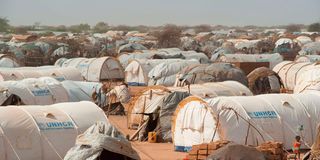Alarm as Cholera outbreak hits Daadab

Tents in Dadaab refugee camp. A crisis is looming in the largest refugee camp in East Africa after two died and 3,000 people tested positive for cholera.
A crisis is looming in East Africa’s largest refugee camp, Daadab, after 3,000 people tested positive for cholera, which has already killed two people.
The camp is home to over 300,000 refugees mostly from neighbouring Somalia.
Comprising three camps—Dagahaley, Ifo, and Hagadera—the Dadaab Refugee camp currently provides shelter to about 245,000 registered refugees, with many having resided at the camp for more than three decades.
In addition, the camps accommodate over 124,000 unregistered refugees, including 67,000 who sought refuge in 2022.
With the severe overcrowding and increased pressure on existing services, including supplies of drinking water and latrines, the situation is likely to worsen. The population at the camp has grown rapidly in recent months due to an extended drought in Somalia.
“The gravity of the situation demands urgent attention, particularly in the areas of water, sanitation and hygiene,” says Hassan Maiyaki, Doctors without Borders (MSF) country director in Kenya.
He adds that the country has witnessed the worst cholera outbreak in five years and the risk of other epidemics breaking out is high.
“If this occurs, it would outstrip medical capacity in the camps, with potentially catastrophic consequences,” he warns
The current cholera outbreak, according to Mr Maiyaki, is linked to reductions in essential water and sanitation activities in the camps, including providing clean water, distributing soap, constructing and repairing latrines, and organising waste management.
“Almost half the camps’ population have no access to functional latrines, leading to open defecation in and around the camps, which raises the risk of disease outbreaks,” he says.
“Despite our health promotion activities and vaccination campaign, controlling this cholera outbreak remains elusive without the prioritisation of resources towards sustained preventive water, sanitation and hygiene interventions,” says Dr Nitya Udayraj, MSF medical coordinator in Kenya. “If they are not improved in quality and scale, it is just a matter of time before we see other epidemics erupt in the camps such as Hepatitis E.”
“All efforts to ease the overcrowding must include significant investment in the water, sanitation and hygiene sector to ensure a minimum standard of living for refugees in all the camps.” Mr Waiyaki said.
MSF now wants the international community, donors and aid agencies to respond urgently to the unfolding crisis in Dadaab, taking immediate action to address the alarming sanitary conditions and prevent the further spread of disease.
The ministry of Health and humanitarian agencies carried out cholera vaccinations and health promotion campaigns to help people protect themselves from the disease, but curbing the outbreak will require improvements to water and sanitation infrastructure.
For the last nine years, the country has been struggling to contain cholera, a diarrhoeal disease caused by Vibrio cholerae bacteria. The disease can be fatal if left untreated.
Cumulatively, the country has recorded over 10,900 cases with 5,800 of the cases being male at 52 per cent while 5, 125 (48 per cent) are females.
Since the first was reported on October 5, last year, 177 Kenyans have succumbed to cholera with a huge number at 78 (44 per cent ) recorded in Nairobi and Tana River counties, while Garissa and Wajir account for 33 (19 per cent) deaths in total.
Currently, 24 counties are actively recording cholera cases.
In the recent month, four people succumbed to cholera in Siaya and Homa Bay counties with hundreds admitted
Kenya has been listed by the United Nations among 43 countries at risk of cholera with the most heavily affected including Malawi and Mozambique, Burundi, Cameroon, the Democratic Republic of Congo, Ethiopia, Kenya, Somalia, Syria, Zambia and Zimbabwe.
The World Health Organization and the children's agency Unicef, UN are seeking $640 million to fight the infectious disease, warning of a "cholera catastrophe" if action is not ramped up immediately.
Dr Ojwang Lusi, a public health expert says the country needs to start educating Kenyans on the risk that comes with the disease and how fatal it is.
“All we need to do is start educating people on the risk that comes with poor handling of food and they also need to observe hygiene by boiling water before drinking. With the drought that has hit the country, water is scarce and people are consuming dirty water. We may record more cases,” Dr Lusi said.





